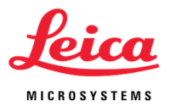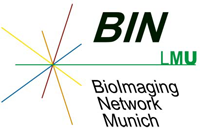Usage Fees
Usage of our microscopes is subject to usage fees as detailed below. We also charge for trainings on confocal and multi-photon systems (but see below).
Assistance
We do not usually charge for assistance such as introductory discussions, advice, and practical help. An exception are projects that require intense, perpetual assistance, e.g. if we continuously accompany the microscopy sessions (€50/h).
Microscope fees
Microscope fees given below are in Euro per hour of booking or usage. (See guidelines (pdf, 256 kb) for details on the charging rules.) Actual invoicing is based on minutes, however.
Fees are different for different user categories as indicated at the top of the columns. For external (non-LMU) users, we have to add taxes (19% Mehrwertsteuer, VAT).
Any fees are subject to changes. Therefore estimations of future fees are preliminary. For long term experiments, see next paragraph.
Please be aware that light microscopy fees can be applied for in grant applications. For DFG-grants, see their form 55.04 "Guidelines for Instrumentation Usage Costs and Core Facilities" (“Hinweise zu Gerätenutzungskosten und zu Gerätezentren”).
The fees below are valid from January 2026 on. Note that, as opposed to previous pricing rules, all academic users now pay the same fee for confocal, multi-photon, STED, FLIM and digital lightsheet microscopy.
| Type of microscopy | Microscope(s) | BMC | LMU | Klinikum LMU | Other Academic | Non-Academic |
| Confocal | Malpighi, Cajal, Kellner, Gaviola, Hooke, Göppert | 14 | 18 | 18 | 25 | 130 |
| Multi-photon | Hooke, Göppert, Gaviola | 14 | 18 | 18 | 25 | 165 |
| STED, digital lightsheet or FLIM | Kellner or Gaviola, respectively | 14 | 18 | 18 | 25 | 235 |
| Motorized wide field: bright field or fluorescence, TIRF | Harvey, Brown, Alhazen | 7 | 10 | 10 | 15 | 40 |
| Stereo Microscope (BF and fluorescence) | Stokes | 4 | 7 | 7 | 10 | 40 |
| Simple bright field or fluorescence | Zernike, Jabłoński | 3 | 7 | 7 | 8 | 40 |
| Imaging Workstation | Lovelace | 3 | 5 | 5 | 8 | 40 |
For any fee, it may become necessary to adapt it during further operation of the Core Facility. Please keep that in mind when applying for grant money.
Long-term experiments
To allow long term, overnight experiments at reasonable costs, only 8 hours are charged during one "day". For technical reasons, "days" are periods starting at 9 a.m. (except weekend) and defined as follows:
Monday 9:00 - Tuesday 9:00 (24 hours)
Tuesday 9:00 - Wednesday 9:00 (24 hours)
Wednesday 9:00 - Thursday 9:00 (24 hours)
Thursday 9:00 - Friday 9:00 (24 hours)
Friday 9:00 - Friday 18:00 (9 hours)
Friday 18:00 - Monday 9:00 (63 hours)
Note that on Friday the "day" has only 9 hours, followed by a long weekend slot. These time slots are applied irrespective of holidays.
Fees for trainings
In the past, we quite often held trainings for users who afterwards never used our microscopes. While we appreciate the general desire to learn about microscopy, this puts a severe strain on our workload. We therefore now charge €200 Euro for the training on laser-scanning microscopes (confocal, multi-photon, fluorescence lifetime, STED, light sheet). After successful training, this amount will be converted into a prepaid account that the trained user can use towards usage fees for the microscope he was trained on within the next three month after initial training. This amount cannot be transferred to other users or microscopes.
In short: you only pay extra for the training if you don't use the microscope afterwards.
In any case, the normal fee for microscope usage applies (non-refundable) as listed in the table above.
Fees for consumables
Generally, we suggest that our users buy their material at a respective lab supplier. However, sometimes you may need something very quickly, or you cannot purchase a reasonable amount, considering delivery fees. In these cases, we may be able to supply small amounts of the following materials to our users. Fees match our rounded acquisition costs and are listed in the booking software.
Of particular importance in standard microscopic preparations is the coverslip, since coverslips are a part of the optical system of a microscope. For high resolution microscopy they must have a thickness of 0.17 ± 0.01 µm: This is the value assumed for the calculations for high resolution objectives by any microscope manufacturer. Coverslips with the wrong thickness introduce spherical aberation and thus loss of resolution and loss of signal intensity. (Yes, it does matter!) Unfortunately, most shops sell coverslips of various wrong thicknesses, like "number 1", which is too thin. So if you buy, make sure you get the right thickness. Currently we are using "Hecht Assistent 1014" (Link to manufacturers pdf). They can be obtained in various sizes (e.g. 8x18 mm, 0.17 ± 0.01 µm; 24x24 mm, 0.17 ± 0.01 µm) through various suppliers.







